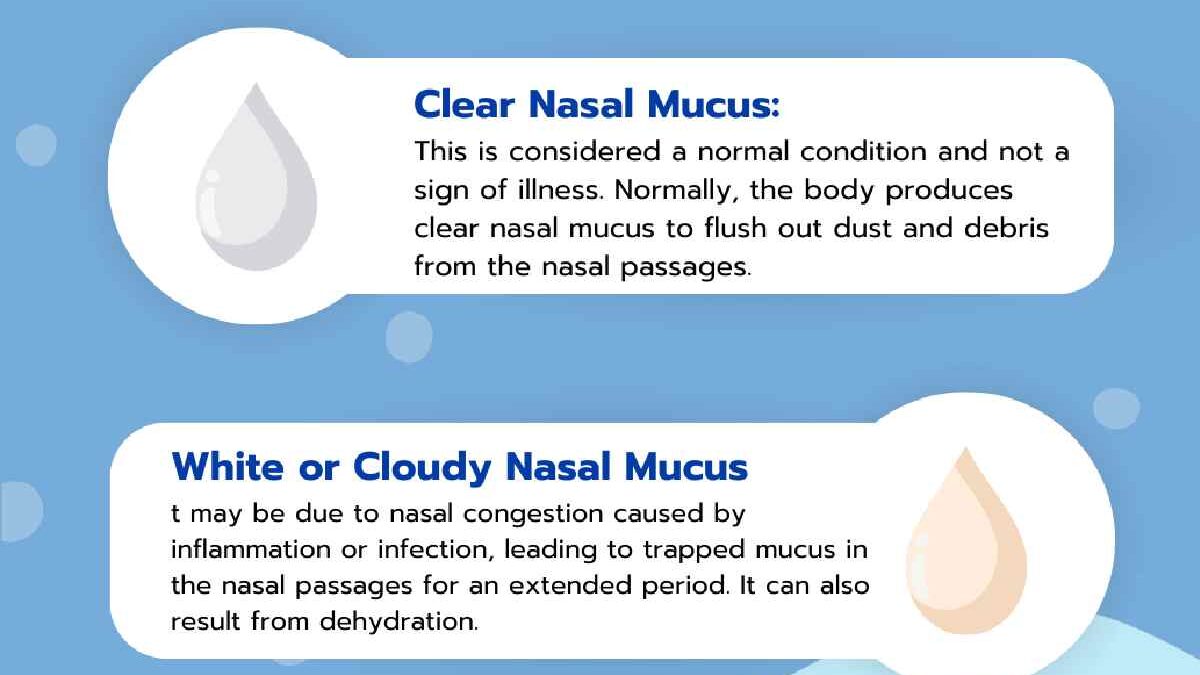Understanding Thick Rubbery White Mucus from the Nose: Nasal mucus is very important to your respiratory health, and it is considered an immunity mechanism against infections and irritants. Thick, rubbery white mucus coming out of your nose is a possible sign of the occurrence of severe conditions, like sinus infection, dehydration, and even an immune system reaction. It almost appears something mundane, but it subsequently serves as a shield, entrapping germs and allergens before they can get to your tissues. Nevertheless, when its texture or color alters, it is usually worth noting because of the need to keep your breathing system functional and healthy.
Table of Contents
What Is The Thick, Rubbery White Nose Mucus?
Alteration of mucus content and secretion in your nasal cavity will be characterized by thick, rubbery, white mucus being synthesized by the nose. Usually, nasal mucus is transparent and performs the purpose of moisturising your nasal cavities and preventing the impact of dangerous substances such as dust, allergens, and pathogens. Thick mucus, however, is likely to emerge as a response to such irritants or infections, and it is all the more effective in guarding against such detrimental incursions into your body.
White mucus is commonly associated with a sign of early immune reaction to bacterial or viral infections. As your body works in repelling intruders, the oversupply of mucus may turn thick or elastic to bind and excrete the pathogens. Although mucus consistency changes are not uncommon, thick mucus that is persistent or recurrent can be an indication that there is something more serious going on, or there is a need to seek medical attention.
How Normal Nasal Mucus Works?

Mucous membranes installed in your nostrils strive to make mucus to cover your respiratory system as a protective layer that is never lacking. This is a thin layer of mucus which mainly contains water and mucins, together making a viscous material that prevents the passage of irritants and makes air flow smoothly.
The production of the mucus varies according to the needs of your body, e.g., when exposed to germs or allergens. As an example, you will produce additional mucus when exposed to airborne irritants in order to sweep away the substances and keep the nose hydrated.
Thin mucus is also significant as it preserves the hydration of the sinuses, making them not dry. This produces limited irritation as well as helps the immune system fight infection. The consistency may be altered due to disruptions, including infections or irritants, and become thicker and rubbery as opposed to thin and watery. When mucus is abnormal, it will assist in the detection of problems if one understands how mucus works normally.
When does mucus thicken and become rubbery?
The changing of mucus varies between the thin and thick and rubbery states when your body is exposed to arising stressors or diseases. The inflammations in the nasal passages usually cause thicker mucus, which also acts as a thicker barrier to outside infections caused by infections or allergies.
Another causative factor is the presence of too much mucus, hence makes it too thick. An event such as a sinus infection, cold, or being exposed to an irritant in the environment stimulates your body to protect itself, which causes your body to produce mucus in a more concentrated form. Such modifications are necessary to trap pathogens that may result in discomfort. Common Causes of Thick, Rubbery White Nasal Mucus
Rubbery mucus that is white is normally an indication that the nasal passages are infected or irritated. Snot may become white as a sign of an early stage of virus infection, which causes common cold, etc., to trap the pathogens so as not to get carried away. Change in color and composition of mucus is the usual result in the case of sinusitis or allergen exposure to factors such as pollen.
Environmental factors, such as dry air, worsen the problem, and the thickness of the mucus indicates the status of the immune response. This knowledge of the triggers can avoid and justify the discomfort.
Sinusitis and Sinus Infections
Another popular cause of thick rubber nasal exudate is sinusitis and sinus infections. Sinus inflammation can usually result in long-term mucus. This occurs when the immune system responds to the pathogens by producing mucus, which is in excess, in an attempt to clear them.
A serious source of sinusitis is caused by bacterial infections, which may cause the mucus to turn green or yellow. The changes in mucus color usually testify to the presence of fighting white blood cells. Typical symptoms that occur in sinus infections that are bacterially driven are facial pain or nasal congestion.
Allergies and Irritants
Irritants in the environment and allergies often contribute to the problem of thick nasal mucus. Allergies cause the immune response in the body; the mucus is produced in excessive amounts to clear the allergens, as well as the irritants such as the pet dander and pollen.
Further mucus production and inflammation in the nose will be aggravated by environmental pollutants like cigarette smoke, and this causes the mucus to be thickened further. In addition, dry air or bad ventilation spaces can add allergens such as molds or dust mites.
Allergies to pet dander are sensitive to allergies when in contact with it.
Cigarette smoke irritates mucous membranes, which makes the production of thick mucus high.
Allergy seasons are characterized by mucus buildup brought about by seasonal surges of pollen.
Poorly cleaned spaces provide an allergic and irritating effect through the piling up of dust and mold.
Symptoms may be controlled by minimising exposure to such triggers through air purifiers, cleaning, and other activities.
The Other Causes of Contribution
Other than the infectivity and allergies, there are other causes of rubbery white nasal mucus. Mucous membranes have to work harder in response to factors in the environment, such as dry air that thicken the mucus. On the same note, dehydration also intensifies this response because the body tries to dampen the required moisture in the nasal lines.
Although some home treatments can help a patient feel better, including saline sprays, it is vital to eliminate these underlying factors, including focusing on bettering indoor air quality or drinking more water. By ignoring such persistent symptoms, the situation may be complicated, and medical analysis has to be undertaken in order to identify the specific underlying factor.
Dehydration and Dry Air
Dehydration and dry air significantly impact mucus production and consistency, often creating dense, rubbery textures within the nasal passages. Insufficient fluid intake dries out the mucous membranes, reducing their ability to maintain thin, flowing mucus.
Dry air exacerbates nasal discomfort, especially during winter or in air-conditioned environments. These conditions prompt your body to produce thicker mucus as a protective response. Medications like nasal sprays or humidifiers can help moisturise dry nasal linings.
Smoothly.
Medications and Underlying Health Conditions
It is usually certain drugs and illnesses that have been disregarded in contributing to a thick nasal mucus. Certain medicines that treat allergies or even lung diseases may affect mucus production and, in some cases, produce a lot. Although decongestants are useful to break down a mucus block, excessive applications can dry out the nasal passages.
Thick mucus may occur as a result of chronic illnesses such as lung disease or cystic fibrosis. The phenomenon in general, and cystic fibrosis, in particular, affects the mucus glands and causes dense mucus formation in the nasal and bronchial regions. Similarly, COPD, also known as chronic obstructive pulmonary disease, is a factor that contributes to the inappropriate production of mucus.
It is still crucial that a medical worker be able to make a professional diagnosis of the symptoms that are associated with long-term health issues. Individuals who experience overwhelming problems with breathing or enormous production of mucus that is associated with such illnesses need to seek medical attention so they can receive personalized treatment as well as management.
The Symptoms That May Co-exist with Thick, Rubbery White Mucus
Thick rubbery mucus seldom exists in isolation, and it is usually accompanied by other symptoms that can help one to get a clue on the cause of its occurrence. These symptoms run merely through the pangs to serious health issues that need attention urgently.
Symptoms
Possible Causes
Facial Pain
Infection of the sinuses, bacterial infection
Difficulty Breathing
Pneumonic disease, thickening of the mucosa in the respiratory tract
Irritation of the back of the throat
Postnasalต drool, continuous thick mucus
Chills and Fever
Hypersecretion of mucus in connection with infection, Infection-related fatigue
Though most of the symptoms may indicate something that can be controlled, they should be assessed thoroughly in case some problems last longer or develop new signs, such as a high fever. Early treatment of accompanying symptoms will put them in a position to treat them effectively and reduce complications.
Conclusion
Finally, it is critical that you know the causes of thick rubbery white mucus of the nose so as to manage your health in an effective manner. It may be sinusitis, allergies, low water levels, or some other causes, but understanding the symptoms and when to refer to medical help can make a great difference to your well-being. You should also know how your body reacts by getting updated. In case you still have some questions or would like to receive more specific guidance, go ahead and ask us to recommend our experts to have a free consultation. It would be a proactive step that would result in the improved management of your symptoms and general health.

